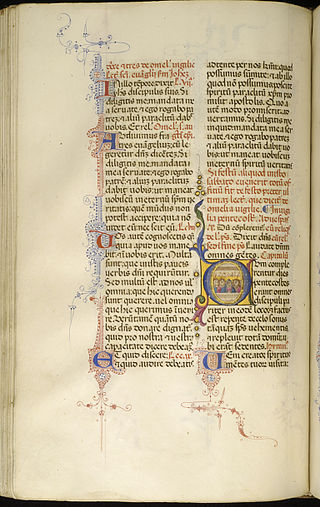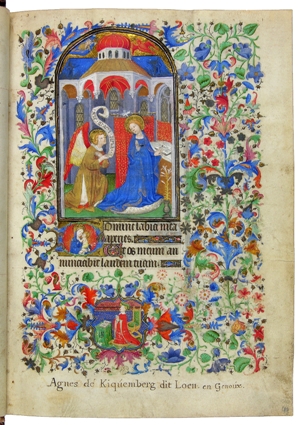Sources
 This article incorporates text from a publication now in the public domain : Herbermann, Charles, ed. (1913). "Rector Potens, Verax Deus". Catholic Encyclopedia . New York: Robert Appleton Company.
This article incorporates text from a publication now in the public domain : Herbermann, Charles, ed. (1913). "Rector Potens, Verax Deus". Catholic Encyclopedia . New York: Robert Appleton Company.
Rector Potens, Verax Deus is the name of the daily hymn for the midday office of Sext in the Roman Breviary and in the Benedictine Rite.
| Latin text | Literal translation |
|---|---|
|
The original version of the Hymn ended the third line with the verb 'instruis.' [1] This was amended during the Renaissance to the more stylistic verb 'illuminas' [2]
As a hymn for the midday office, the focus of the hymn is physically upon the midday sun. Metaphorically and allegorically the hymn goes from the heat of the sun, to the heat of argument, which the hymn asks God's assistance to avoid. In Christian tradition midday was considered the time when Eve was tempted by Satan and committed the first sin, [3] and so this gives added force to the prayer of the hymn, asking God to protect against strife.
The origins of the hymn are unknown. But the similarity of this hymn with the hymns for Terce (Nunc sancte nobis spiritus) and None (Rerum Deus Tenax Vigor) means that it probably shares the same author. Baudot ("The Roman Breviary", London, 1909, 34) thinks the hymn is "probably" by St. Ambrose. However none of this set of three hymns are found in the oldest Benedictine collections of hymns, where Ambrose's other works are found. All three of these hymns are found in later Celtic collections. suggesting that they probably have a different author. (For discussion of authorship, see Rerum Deus Tenax Vigor).
| J. M. Neale (1818-1866) | J. H. Newman |
|---|---|
|
|
The hymn has been set to many different tunes. The following links give examples:

The Roman Breviary is a breviary of the Roman Rite in the Catholic Church. A liturgical book, it contains public or canonical prayers, hymns, the Psalms, readings, and notations for everyday use, especially by bishops, priests, and deacons in the Divine Office.

Vespers is a liturgy of evening prayer, one of the canonical hours in Catholic, Eastern Orthodox, Oriental Orthodox, and Lutheran liturgies. The word for this fixed prayer time comes from the Latin vesper, meaning "evening".

In the practice of Christianity, canonical hours mark the divisions of the day in terms of fixed times of prayer at regular intervals. A book of hours, chiefly a breviary, normally contains a version of, or selection from, such prayers.

The Ambrosian Rite is a Catholic Western liturgical rite, named after Saint Ambrose, a bishop of Milan in the fourth century, which differs from the Roman Rite. It is used by some five million Catholics in the greater part of the Archdiocese of Milan, in some parishes of the Diocese of Como, Bergamo, Novara, Lodi, and in the Diocese of Lugano, Canton of Ticino, Switzerland.

Compline, also known as Complin, Night Prayer, or the Prayers at the End of the Day, is the final prayer liturgy of the day in the Christian tradition of canonical hours, which are prayed at fixed prayer times.

The Liturgy of the Hours or Divine Office or Opus Dei are a set of Catholic prayers comprising the canonical hours, often also referred to as the breviary, of the Latin Church. The Liturgy of the Hours forms the official set of prayers "marking the hours of each day and sanctifying the day with prayer." The term "Liturgy of the Hours" has been retroactively applied to the practices of saying the canonical hours in both the Christian East and West–particularly within the Latin liturgical rites–prior to the Second Vatican Council, and is the official term for the canonical hours promulgated for usage by the Latin Church in 1971. Before 1971, the official form for the Latin Church was the Breviarium Romanum, first published in 1568 with major editions through 1962.

The Office of the Dead or Office for the Dead is a prayer cycle of the Canonical Hours in the Catholic Church, Anglican Church and Lutheran Church, said for the repose of the soul of a decedent. It is the proper reading on All Souls' Day for all departed souls (Purgatory), and can be a votive office on other days when said for a particular decedent. The work is composed of different psalms, scripture, prayers and other parts, divided into The Office of Readings, Lauds, Daytime Prayer, Vespers and Compline.
Nones, also known as None, the Ninth Hour, or the Midafternoon Prayer, is a fixed time of prayer of the Divine Office of almost all the traditional Christian liturgies. It consists mainly of psalms and is said around 3 pm, about the ninth hour after dawn.

Terce is a canonical hour of the Divine Office. It consists mainly of psalms and is held around 9 a.m. Its name comes from Latin and refers to the third hour of the day after dawn. With Prime, Sext, None and Compline it belongs to the so-called "Little hours".
Sext, or Sixth Hour, is a canonical hour of the Divine Office of almost all the traditional Christian liturgies. It consists mainly of psalms and is held around noon. Its name comes from Latin and refers to the sixth hour of the day after dawn. With Terce, None and Compline it belongs to the so-called "Little Hours".
Rerum Deus Tenax Vigor is the daily hymn for None in the Roman Catholic Breviary.
The Ambrosian hymns are a collection of early hymns of the Latin liturgical rites, whose core of four hymns were by Ambrose of Milan in the 4th century.
The Aquileian Rite was a particular liturgical tradition of the Patriarchate of Aquileia and hence called the ritus patriarchinus. It was effectively replaced by the Roman Rite by the beginning of the seventeenth century, although elements of it survived in St. Mark's Basilica in Venice until 1807.
Deus is the Latin word for "god" or "deity". Latin deus and dīvus ("divine") are in turn descended from Proto-Indo-European *deiwos, "celestial" or "shining", from the same root as *Dyēus, the reconstructed chief god of the Proto-Indo-European pantheon.
O Deus ego amo te may refer to one of two Latin lyrics sometimes attributed to St. Francis Xavier, but of uncertain date and authorship.

Te lucis ante terminum is an old Latin hymn in long metre. It is the hymn at Compline in the Roman Breviary.
Rerum may refer to :

"Te Splendor" is a Roman Catholic hymn dedicated to Saint Michael, the Archangel. The hymn derives its name from the fact that in Latin it begins with the words: Te splendor et virtus Patris. The hymn is found in the Roman Breviary.
The Cistercian Hymnal is a compilation of the ancient texts and melodies sung by Cistercian monks and nuns during the Liturgy of the Hours. This collection of hymns influenced the Cistercian Order's identity, since early abbots emphasized the compositions' musical quality. The hymnal developed in the course of the centuries.

Lucis Creator Optime is a 5th-century Latin Christian hymn variously attributed to St Gregory the Great or Saint Ambrose. It takes its title from its incipit.
{{cite book}}: |website= ignored (help)